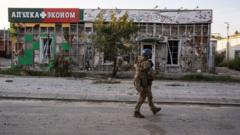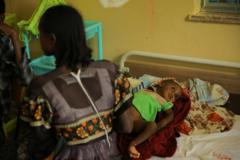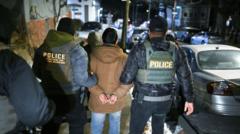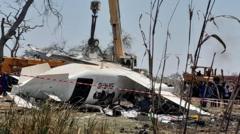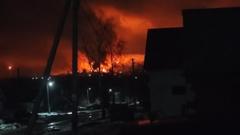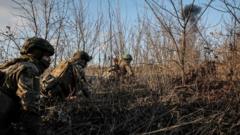President Trump's abrupt freeze on foreign aid has led to worsening humanitarian crises worldwide, leaving millions vulnerable as critical services are suspended. Aid workers report dire conditions in places like Sudan, Thailand, and Ukraine, with organizations struggling to meet desperate needs.
Global Humanitarian Crisis Deepens Following Trump's Foreign Aid Cut

Global Humanitarian Crisis Deepens Following Trump's Foreign Aid Cut
Millions affected as U.S. foreign aid freeze halts essential services in countries like Sudan, Thailand, and Ukraine, raising alarm among aid organizations.
Article Text:
In a significant shift of policy, President Trump's recent order to freeze nearly all U.S. foreign aid has catalyzed a series of humanitarian crises around the globe, exacerbating distress in already vulnerable regions. The immediate impacts are being felt acutely, with millions depending on U.S.-sponsored relief efforts now facing dire situations.
In Sudan, soup kitchens that once served nearly 816,000 individuals have abruptly shut down, leaving countless civilians trapped in war-torn conditions. Meanwhile, critical facilities providing maternal healthcare, vaccinations, and essential firewood have been forced to suspend operations altogether.
The situation in Thailand is similarly alarming, where hospitals are refusing treatment to refugees suffering from life-threatening conditions, leaving many to rely on makeshift measures. Recently, patients were told to vacate a U.S.-funded hospital near the Myanmar border, underlining the real-world ramifications of the aid cut.
In Ukraine, residents along the front lines of the ongoing conflict with Russia now face severe shortages, including heating supplies as winter approaches. Reports indicate that many are enduring the cold without access to firewood just as temperatures plummet.
Atif Mukhtar, a volunteer with the Emergency Response Rooms in Khartoum, described the atmosphere surrounding the aid freeze as one of chaos and desperation: "Everyone is freaking out." The swift cessation of these funds has raised profound questions regarding the United States' role and reliability as a global humanitarian leader, casting a long shadow over its commitment to aid those most in need.
Moreover, aid workers have reported alarming statistics, with approximately 40 newborns contracting HIV daily due to the halt in funding for vital antiretroviral medications. Additionally, U.S. contractors providing critical security for camps housing ISIS members have also had to cease their operations, further complicating the situation.
As the world grapples with the impact of this drastic decision, the interplay between domestic policies and global humanitarian responsibilities is under intense scrutiny. The lasting effects of these aid freezes could redefine the concept of American leadership on the international stage, with millions of lives hanging in the balance.
In a significant shift of policy, President Trump's recent order to freeze nearly all U.S. foreign aid has catalyzed a series of humanitarian crises around the globe, exacerbating distress in already vulnerable regions. The immediate impacts are being felt acutely, with millions depending on U.S.-sponsored relief efforts now facing dire situations.
In Sudan, soup kitchens that once served nearly 816,000 individuals have abruptly shut down, leaving countless civilians trapped in war-torn conditions. Meanwhile, critical facilities providing maternal healthcare, vaccinations, and essential firewood have been forced to suspend operations altogether.
The situation in Thailand is similarly alarming, where hospitals are refusing treatment to refugees suffering from life-threatening conditions, leaving many to rely on makeshift measures. Recently, patients were told to vacate a U.S.-funded hospital near the Myanmar border, underlining the real-world ramifications of the aid cut.
In Ukraine, residents along the front lines of the ongoing conflict with Russia now face severe shortages, including heating supplies as winter approaches. Reports indicate that many are enduring the cold without access to firewood just as temperatures plummet.
Atif Mukhtar, a volunteer with the Emergency Response Rooms in Khartoum, described the atmosphere surrounding the aid freeze as one of chaos and desperation: "Everyone is freaking out." The swift cessation of these funds has raised profound questions regarding the United States' role and reliability as a global humanitarian leader, casting a long shadow over its commitment to aid those most in need.
Moreover, aid workers have reported alarming statistics, with approximately 40 newborns contracting HIV daily due to the halt in funding for vital antiretroviral medications. Additionally, U.S. contractors providing critical security for camps housing ISIS members have also had to cease their operations, further complicating the situation.
As the world grapples with the impact of this drastic decision, the interplay between domestic policies and global humanitarian responsibilities is under intense scrutiny. The lasting effects of these aid freezes could redefine the concept of American leadership on the international stage, with millions of lives hanging in the balance.

